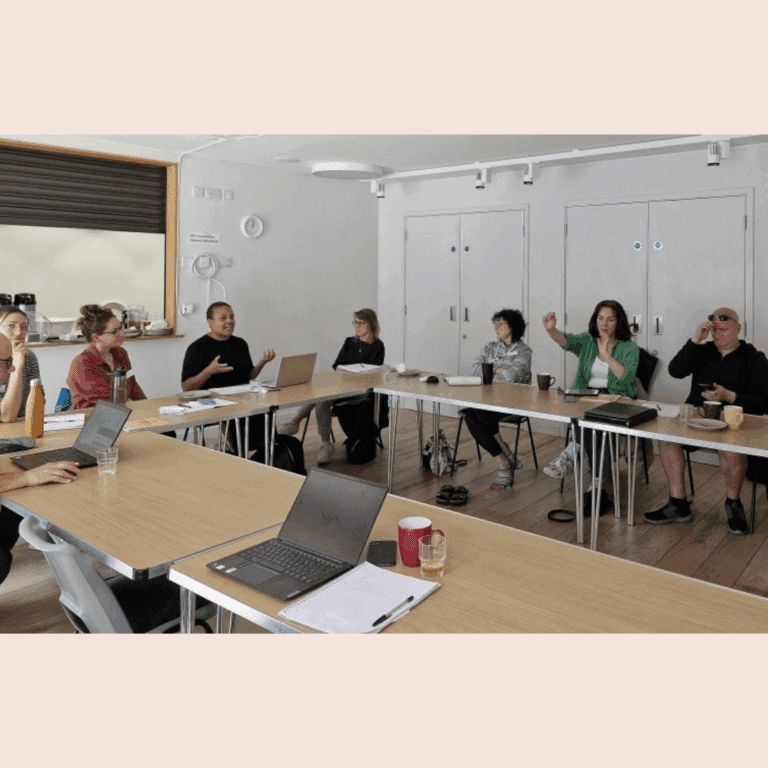Weaving just transition into project development
Our Mission Net Zero workshop series, ‘Introduction to Community Action on Climate and Energy’ ran between January and June 2025. Based on this experience, this news post shares how work towards a just transition can be centred in project development.
In the final session of the Mission Net Zero workshop series, ‘Introduction to Community Action on Climate and Energy’, Grace Reid, the Inclusion Associate on the project, shared how we can ensure the transition to a zero-carbon city can bring us closer to a socially-just city, where all our communities thrive.
The role of Inclusion Associate was created in recognition of the risks involved in the transition to a zero-carbon city. This project, bringing together expertise in energy systems, investment models and community engagement, may either further entrench existing inequalities, or create new barriers, unless approaches are consciously designed to make sure that costs and benefits are fairly distributed. The objective of her role is to ensure that any new projects that emerge are designed with this in mind.
Grace explained her purpose of her role, the approach she has taken to scoping the project, shared some of her initial findings and how her work is helping ensure that the outputs of Mission Net Zero are aligned with a just transition. As part of her work, she surveyed over 40 people working on the project, to gauge their knowledge and attitudes to social justice, inclusion and equity, and their understanding of how the work they are developing affects these.
She shared that this might mean ensuring that training pathways for new green jobs in construction, retrofit, nature restoration and the environmental sector are inclusive by design. These pathways should be welcoming to currently underrepresented groups such as people of the Global Majority, disabled and working-class individuals, as well as young people without formal qualifications.
It might include considering how procurement systems for retrofit contracts could allow local SMEs to bid on a level playing field with national companies, keeping the economic benefits of decarbonisation in local communities.
It might also mean ensuring renters and underserved communities are not excluded from the benefits of decarbonisation, and that efforts to retrofit housing stock don’t result in gentrification.
It could also be achieved by measures such as creating standards for genuine community engagement, including compensating people for sharing their expertise.
Within the workshop, these risks and opportunities were discussed, with attendees given a chance to think about how they might impact their own climate and nature action planning. One attendee commented that the language of just transition needs to be clear and accessible, with sharing examples of what it means in action for communities, an important part of this.
In the context of decarbonising Bristol’s buildings, transportation and energy systems, a just transition is one that delivers social and economic opportunities to all communities. It is a transition where everyone has a voice and agency to influence how this work is undertaken, and where low-income households, those in fuel poverty or those employed in carbon-intensive industries are supported and protected.
At our 2023 Partnership Gathering, keynote speaker, Ed Atkins said, “a just transition encompasses more than just decarbonisation. Instead, climate action takes into consideration the immediate concerns of individuals who worry about the cost of living and their ability to make ends meet”. Making the opportunities of decarbonisation relevant and accessible to people across the city and region is key to ensuring that communities have a chance to influence how we get there.
Grace’s work has helped to enable partners to develop ambitious goals in line with just transition principles.
This approach is something that Bristol Climate & Nature Partnership has implemented before. Our Community Leadership Panel on Climate and Just Transition is a model of community influence and leadership, developed in collaboration with Praxis Research, that brings diverse community insights and lived experiences to strategic thinking and planning around climate and nature. The Climate & Disability Project works to ensure that the voices of Disabled people in Bristol are heard when changes are being planned, for example to transport and energy systems, to ensure that climate work does not create further barriers for Disabled people.
This workshop series is part of Mission Net Zero and is funded by Innovate UK’s Net Zero Living programme. Bristol Climate & Nature Partnership, Centre for Sustainable Energy, Bristol Energy Network, and Bristol City Council are working together to deliver this workshop series.
Learn more about Mission Net Zero
Share to
